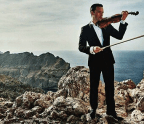An impressive Leningrad from the LSO

Shostakovich
Symphony No. 7
London Symphony Orchestra/Gianandrea Noseda
LSO Live LSO 0859 (CD/SACD) 75:00 mins
Recorded in remarkably vivid sound at the Barbican in December 2019, this is an exceptionally fine performance. Gianandrea Noseda brings a tremendous sense of strength and purpose to the opening, and the ensuing lyrical episode evokes a real sense of nostalgia before this pastoral idyll is shattered by the emergence of the invasion theme. Starting at a barely audible treble pianissimo, Noseda builds up this section with phenomenal control of tempo and orchestral timbre so that when the extra brass instruments enter the fray at the change of key, the effect is absolutely terrifying
The LSO’s principal wind players excel in their many solos, in particular the mournful bassoon lament near the end of the first movement, the sinister bass clarinet and double bassoon and pleading oboe in the second, and the warmly lyrical flute in the third. I also admire Noseda’s balancing of wind, brass and harp timbres in the Stravinskian opening to the Adagio – a passage that on some other recordings can so easily sound fuzzy.
The LSO’s principal wind players excel in their many solos
In the Finale’s opening section, Noseda ensures structural cogency is maintained during the increasingly furious outbursts of energy, and the snapped string pizzicatos that follow have tremendous bite. Thereafter, Noseda takes something of a gamble by taking the at an extremely steady tempo, thereby allowing
You’re reading a preview, subscribe to read more.
Start your free 30 days



